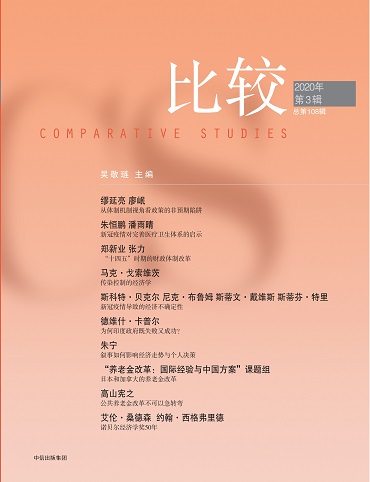《比较》总第108辑
本文来源于《比较》 2020年第3期 出版日期 2020年06月
- 政策的非预期陷阱:体制机制视角
- Policy Trap of Unintended Consequences: System and Mechanism Perspectives
- by Yanliang Miao and Min Liao
缪延亮 廖岷

前沿Guide
- 传染控制的经济学
- The Economics of Infection Control
- Mark Gersovitz
马克·戈索维茨
- 新冠疫情导致的经济不确定性
- COVID-Induced Economic Uncertainty
- by Scott Baker, Nick Bloom, Steven J. Davis and Stephen J. Terry
斯科特·贝克尔 尼克·布鲁姆
斯蒂文·戴维斯 斯蒂芬·特里
改革论坛Reform Forum
- 新冠疫情对完善医疗卫生体系的启示
- Implications on Healthcare System Reform under the Spread of COVID-19 Pandemic
- by Hengpeng Zhu and Yuqing Pan
朱恒鹏 潘雨晴
改革论坛Reform Forum
- 从“账房先生”到国家治理:
“十四五”时期的财政体制改革 - From Cashier to State Governance: The Fiscal Reforms during the 14th Five-year Plan
- by Xinye Zheng and Li Zhang
郑新业 张力
比较制度分析Comparative Studies
- 为何印度政府既失败又成功?
- Why Does the Indian State Both Fail and Succeed?
- by Devesh Kapur
德维什·卡普尔
新书架New Books
- 叙事如何影响经济走势与个人决策:评《叙事经济学》
- How Narratives Influence Economic Trends and Individual Decisions: Comment on Narratives Economics
- by Ning Zhu
朱宁
养老金专题On Pension
- 日本养老金制度的特点和演变
- The Features and Evolution of Pension Reform in Japan
- by Li Cao
曹莉
- 加拿大养老金体系架构与运作
- The Structure and Operation of Canada’s Pension System
- by Tao Tang
唐滔
- 公共养老金改革不可以急转弯:
以日本为例 - Pension Reform Should Not Make a Sharp Turn: An Example of Japan
- by Noriyuki Takayama
高山宪之
视界Horizon
- 诺贝尔经济学奖50年
- The Nobel Prize in Economics Turns 50
- by Allen R. Sanderson and John J. Siegfried
艾伦·桑德森 约翰·西格弗里德



 京公网安备 11010502034662号
京公网安备 11010502034662号 